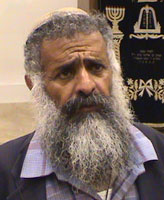Beit Midrash
- Sections
- The Life of Tzaddikim
- Harav Tzvi Yehuda Hacohen Kook
Rabbi Tzvi Yehudah made the study of "Hafetz Hayim-Shemirat Halashon" obligatory in the Yeshiva. He was, it follows, most cautious about how he expressed himself. On one occasion, when he returned home from prayer, his taxi driver accidentally drove past his house. "Oops," said the driver, "I'll have to back up." Rabbi Tzvi Yehudah immediately corrected him, saying, "You have to proceed backwards."
On another occasion, Rabbi Tzvi Yehudah was asked to "descend" a stairway. He immediately replied, "I do not 'descend'!" (implying that 'descent' has a negative connotation and that such expressions should be avoided). Any time there was an argument between two parties, he would not listen to the claims of one side unless the second party was present.
Regarding the intermingling of boys and girls the rabbi would say, "I know of no such permit." He made his position on this matter public, writing, "Let us not lie to ourselves, as if the Torah had permitted the intermingling of boys and girls."
When he had to make his way through a group of women and there was no way around it, he would take hold of my hand. He did this in light of the words of the sages who teach that an individual man should not pass between two women. Once, the rabbi delayed reciting the Grace after Meals because there was a rabbi's wife present whose sleeves, though they covered her elbows, did not reach her wrists.
Rabbi Tzvi Yehudah once joined a wedding for a short time, arriving while the bride and groom were in the cheder yichud ("room of privacy"). He refrained from partaking of the meal, quoting the Talmud, "Whosoever partakes of the wedding meal of a bridegroom and does not felicitate him violates 'the five voices' mentioned in the verse: 'The voice of joy,' etc. (Jeremiah 33:2)."
When they called him up to the Torah, he reacted with alacrity, without delay, in keeping with what is written by Pri Megadim regarding the reason for taking the shortest route possible when going up to the Torah: "To demonstrate one's love for [the Torah] and one's desire to read from it."
Rabbi Tzvi Yehudah likewise practiced that fundamental Torah law, "Love your fellow as yourself," and he would receive all people warmly.
Whenever he reached home, before entering, he would knock, even though he knew that nobody was inside. This practice was in keeping with the words of the sages in tractate Derkh Eretz Rabbah: "A person must not enter his home suddenly."
Rabbi Tzvi Yehudah's approach to matters relating to the Nation of Israel as a whole was no different than his approach to the fine details of Jewish law: Once, the rabbi, with a handful of students, went to help settle an "illegal" outpost at Chawara. When asked by authorities to leave the premises, he responded unflinchingly: "For the sake of self-sacrifice! Put me in jail! Beat me! It won't work! All of this is null and void. Even if the entire government were to come here, it wouldn't change a thing. Self-sacrifice to give one's life rather than violate the commandment!" The rabbi emphasized, "This is an unchangeable law, a Torah ruling!"
On numerous occasions the rabbi emphasized that the foundation and root of the entire Torah is the positive commandment to settle the entire land of Israel. Rabbi Tzvi Yehudah explained that this is not some personal matter, heaven forbid, dependent upon the "will of the nation" or the government.
Regarding the question of a national referendum, Rabbi Tzvi Yehudah ruled, "No referendum has the power to nullify the Torah prohibition, 'Do not give [the nations] a place to settle on the land.' "
On one rare occasion the rabbi expressed himself in an exceptionally strong manner: "The curse of God, the Lord of Israel, the eternity of Israel, and the nation of Israel, will afflict those who contrive to steal from us these portions of our land."
Rabbi Tzvi Yehudah also made it clear that if there be coercion to give the nations part of the land of Israel, or to uproot a Jewish settlement from the land of Israel, "every Jew faithful to Israel is entirely obligated to demonstrate complete self-sacrifice to prevent even the slightest surrender of 'the land of our life.' "
Regarding the Israeli government, the rabbi emphasized, "We are commanded by the Torah, not by the government. The Torah comes before the government."
These are a just a few points of light relating to the behavior of our beloved mentor, Rabbi Tzvi Yehudah Kook, of blessed memory. They underpin and strengthen the words of our sages, who teach, "Jewish law is the word of God." By embracing this idea, a person merits the fulfillment of the verse, "You, who cling to God your Lord, are all living today."
When Faith is Tested
Rabbi Zalman Baruch Melamed | Heshvan 9 5782
"Your People, They Are All Righteous"
Rabbi Zalman Baruch Melamed
Our Mentor, Rabbi Tzvi Yehuda HaCohen Kook zt”l
Rabbi Zalman Baruch Melamed | 5751
























